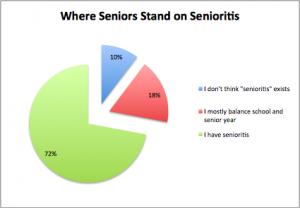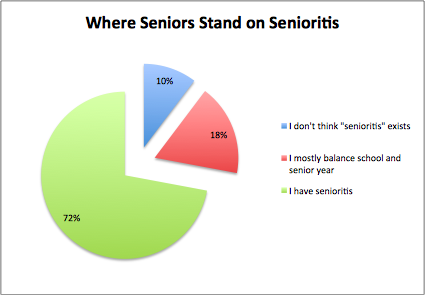Freshman year is a new start for many students — to have a clean slate, make new friends, and ultimately start fresh. Some admit that their first year is nerve-wrecking as the transition to high school can be intimidating at first.
On the other hand, seniors — for the most part — are just counting down the days until graduation. In fact, some are so occupied with counting down the days that they forget it is still a requirement to attend school during their last year.
The debate on whether senioritis really exists is quite controversial among high school: Are students truly affected by this so-called disease, or have past seniors coined this phrase as an excuse to take it easy during their final year?
In the simplest way, senioritis can be conceptualized by the idea of Usain Bolt sprinting in a race when just inches before crossing the finish line, he slows down to a nice walk because he’s practically reached the end.
Why waste your energy if you’ve already made it… right?
The mindset of seniors can be understood especially with the excitement of college just around the corner.
Senior Simone McCarthy shared her senior year experience and said, “Senioritis is terrible. You have so much stress about what you need to do for the application, and college feels so close that you don’t even want to go to school anymore because there’s no reason to.”
While some struggle harder than others to overcome this infection of senioritis, most upperclassmen seem to be affected in some way or another.
Overall, here are some general differences one can expect while transitioning from fresh meat to the top of the high school food chain.
|
Freshmen |
Seniors |
|
– waking up early to get to school on time – caring about appearance (i.e. dressing to impress, spending time on hair) – “freshmen backpacks” – struggling to adjust to heavier workload – signing up for several clubs/extracurriculars – motivated, determined students |
– being late to school/not going to school – no makeup/sweats to school – light weight or no backpack – homework is not a priority (maintain C average for colleges) – stretch the rules (i.e. text in class) – lazy, distracted students |
Sophomore Clara Romani said, “People generally care more about school as freshmen because it sets the tone for the rest of high school. It’s about making a first impression. I think seniors actually have more of a workload, they just don’t try as much anymore.”
In regard to how much effort she put into her appearance during freshman year, Romani recalled, “I tried not to look really bad, but I didn’t dress up either. I just wouldn’t really wear sweatpants and sweatshirts as much.”
Freshman Alexa Bayangos held a similar opinion.
“Adjusting as a freshman isn’t that hard. It’s just about balancing it all out,” said Bayangos, who juggles working, playing basketball, and playing the clarinet.
Out of a survey conducted on 68 seniors, the polls revealed that senioritis may in fact be very real for many students:
 Senior Ethan Wallace admitted to also having fallen as a victim to this “disease.”
Senior Ethan Wallace admitted to also having fallen as a victim to this “disease.”
Wallace reflected back on his years as a lowerclassman and said, “I thought that the seniors were making it up. He had felt that they should, “Just deal with it.”
However, his views have changed since the beginning of senior year.
“Now that I’m in the process of applying to colleges myself, I have a more in-depth understanding of how important high school is. But there is just so much work to do for college.”
For the majority of students, senioritis seems to be an inevitable drawback of the final year of high school. And the only cure known to date happens to be graduation.

